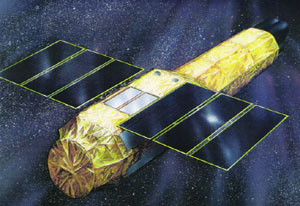|
|
Suzaku (aka Astro-E2)

Astro-E2 was successfully launched on 12:30 pm
JST on July 10, 2005 from the Uchinoura Space Center (USC) in Japan. Soon
after launch, the mission was renamed Suzaku.
Suzaku is the re-build of Astro-E, which was unfortunately lost during launch
(10 February 2000).
Suzaku (as Astro-E) has been developed at the Japanese Institute of Space
and Astronautical Science (ISAS) in collaboration with the US.
This is Japan's fifth X-ray astronomy mission.
Suzaku is the first satellite that carries a new type of X-ray
spectrometer, the X-ray micro-calorimeter, which provides unprecedented
energy resolution compared to non-dispersive instruments.
Mission Characteristics
 Lifetime :
10 July 2005 - 2 September 2015 Lifetime :
10 July 2005 - 2 September 2015
 Energy Range : 0.2-600 keV Energy Range : 0.2-600 keV
 Special Features
: First X-ray micro-calorimeter in space Special Features
: First X-ray micro-calorimeter in space
 Payload :
Payload :
- Five nested conical thin-foil grazing incidence telescopes (XRT),
with a angular resolution of ~2 ´ (HPD); all gold-coated.
Focal lenght : 4.75m (XRT-I, 4 units); 4.5m (XRT-S, 1 unit)
At the focus of each telescope there is one of the following detectors :
- X-ray Spectrometer (XRS; 0.3-12 keV; one unit)
An X-ray micro-calorimeter composite of 32 pixels
at the foci of the XRT-S.
Eff Area 190 cm2 @ 1.5keV
Energy resolution ~6.5 eV (FWHM) at 6 keV
FOV 2.9´ X 2.9´
- X-ray Imaging Spectrometer (XIS; 0.2-12 keV; four units)
Each unit is a 1024 X 1024 pixel CCD detector
at the foci of one XRT-I.
Three CCDs are front illuminated (FI), one is back illuminated (BI)
Eff. area 340 cm2 (FI) and 390 cm2 (BI) @ 1.5 keV
Energy resolution 130 eV at 6 keV
FOV 18´ X 18´
- Hard X-ray Detector (HXD; 10-600 keV)
GSO crystal scintillator (> 30 keV) & silicon PIN diodes (< 60 keV)
Eff. area ~145 cm2 @ ~15 keV (PIN) , 315cm
2 at 2 @ ~100 keV (GSO)
Energy resolution 3 keV FWHM, 7.6/(E MeV)
0.5 % FWHM
FOV 34´ X 34´ < 100 keV and 4.5° X 4.5° > 100 keV
 Archive : HEASARC hosts the Catalogs, Lightcurve , Spectra and Raw data.
Archive : HEASARC hosts the Catalogs, Lightcurve , Spectra and Raw data.
[Suzaku/Astro-E2 Guest Observer Facility]
[All Missions]
[by Time]
[by Energy]
Page authors: Lorella Angelini Jesse Allen
HEASARC Home |
Observatories |
Archive |
Calibration |
Software |
Tools |
Students/Teachers/Public
Last modified: Thursday, 24-Sep-2020 18:05:46 EDT
|


